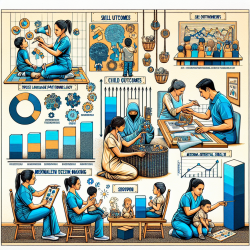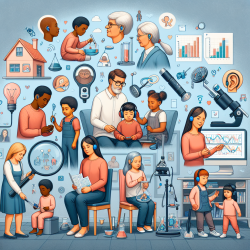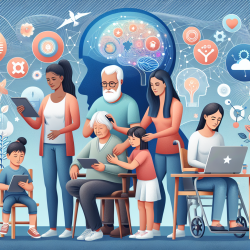Introduction
The ongoing COVID-19 pandemic has exacerbated mental health challenges, particularly among mothers with young children. The study titled "Building Emotional Awareness and Mental Health (BEAM): study protocol for a phase III randomized controlled trial of the BEAM app-based program for mothers of children 18–36 months" offers significant insights into how digital interventions can be leveraged to improve maternal mental health and, consequently, child outcomes. This blog post aims to explore how practitioners can apply the findings of this research to enhance their skills and improve therapeutic outcomes for families.
Understanding the BEAM Program
The BEAM program is an app-based intervention designed to address maternal depression and anxiety, improve parenting stress, and enhance family relationships. It utilizes a comprehensive approach that includes psychoeducation modules, an online social support forum, and weekly group teletherapy sessions. The program's efficacy is being evaluated through a two-arm randomized controlled trial (RCT) involving 140 mothers who report moderate-to-severe symptoms of depression and/or anxiety.
Key Findings and Implications for Practitioners
The BEAM study underscores the potential of eHealth interventions in mitigating maternal mental health issues and improving child functioning. Here are some key findings and their implications for practitioners:
- Reduction in Maternal Depression: The primary outcome of the BEAM program is the reduction of maternal depression symptoms. Practitioners can incorporate similar app-based interventions to provide accessible mental health support to mothers, especially in remote or underserved areas.
- Enhanced Parenting Skills: The program's focus on emotion-focused parenting strategies can help practitioners guide parents in understanding and managing their children's emotions, leading to improved parent-child interactions.
- Improved Family Relationships: By fostering better family dynamics, practitioners can help create a supportive environment that benefits both the mother and child. The integration of peer support within the program highlights the importance of community in mental health interventions.
Encouraging Further Research and Application
While the BEAM program provides a robust framework for addressing maternal mental health, it also opens avenues for further research and application in speech language pathology. Practitioners are encouraged to explore the following:
- Adaptation of Digital Interventions: Consider how digital tools can be adapted to support language development and communication skills in children, particularly those affected by maternal mental health issues.
- Collaborative Approaches: Engage in interdisciplinary collaborations to develop comprehensive intervention programs that address both maternal and child needs.
- Longitudinal Studies: Conduct longitudinal studies to assess the long-term impact of maternal mental health interventions on child development and language acquisition.
Conclusion
The BEAM program exemplifies how data-driven, digital interventions can significantly impact maternal mental health and child outcomes. By integrating these insights into practice, speech language pathologists and other practitioners can enhance their therapeutic approaches, ultimately leading to better outcomes for children and families. For those interested in delving deeper into the research, the original study provides a comprehensive overview of the methodology and findings.
To read the original research paper, please follow this link: Building Emotional Awareness and Mental Health (BEAM): study protocol for a phase III randomized controlled trial of the BEAM app-based program for mothers of children 18–36 months.










